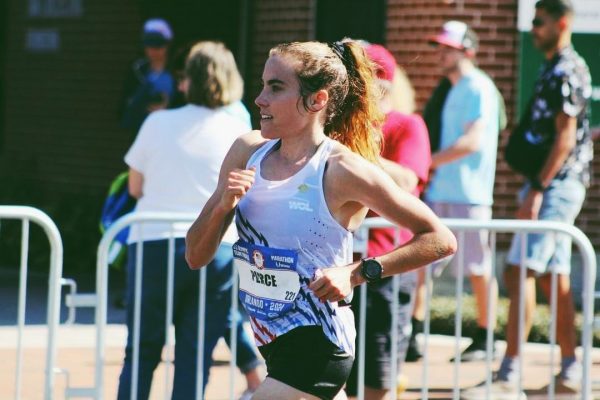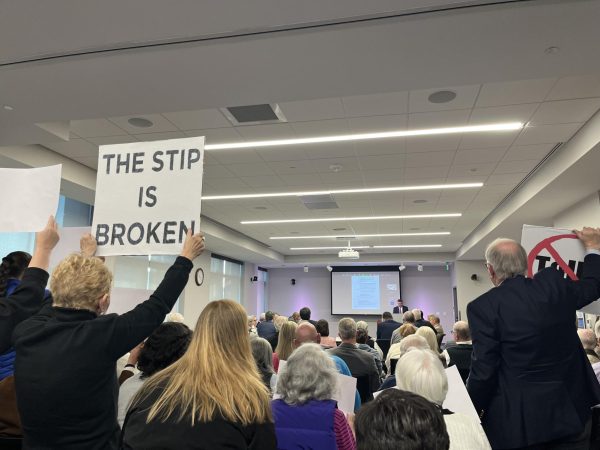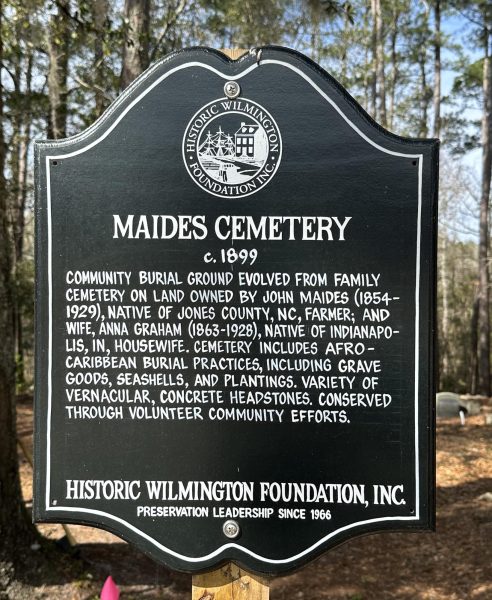Is a UNCW policy unknowingly jeopardizing national security by violating federal law?
September 26, 2016
In November 2011, just a month before the United States would pull out of Iraq under the Status of Forces Agreement signed by former President George W. Bush in 2008, the Pentagon issued a reminder to all military branches about the photocopying of military identification cards.
The Defense Department memo stated that there had been “recent incidents reported of commercial establishments photocopying U.S. government identification to verify military affiliation or provide government rates for service.” At the time, hotel chains and military friendly companies alike were unknowingly breaking an obscure federal law in order to provide service members with discounts on products.
There are no safeguards to prevent counterfeiting once commercial establishments photocopy the identification card, the memo states, suggesting that criminal elements and terrorist organizations seek to obtain the cards for nefarious reasons, asserting, “If a copied military or government identification fell into the wrong hands, it could spell disaster for the Armed Forces and the nation.”
With this in mind, The Seahawk wanted to examine this federal law and determine if the University of North Carolina Wilmington violated this law—a national security issue—in an attempt to honor the military service of their students or if the university is authorized under federal law to conduct these procedures in accordance with normal business functions.
During the reporting process, The Seahawk conducted interviews with multiple lawyers from a variety of legal specialties that include constitutional interpretation, civil litigation, national security and military law.
Interviews were also conducted with former members of the armed forces, and The Seahawk received statements from the Pentagon, the Department of Justice for North Carolina and UNCW’s Office of the General Council regarding the university’s interpretation of the law. The Seahawk continues to conduct reporting on this issue as of this article’s publication date.
The law: Up for interpretation
For the past six to seven years, UNCW has been issuing special parking permits to its military affiliated students, according to Ken Kaiser, who has been managing the parking and transportation auxiliary services office.
Located in the Warwick Center, the office manages the university’s parking resources and facilitates both on and off campus property.
“Within the past couple years, we changed our permits to add a specific identifier in order to identify our military students,” Kaiser told The Seahawk in a phone interview. “We’ve also designated about six spaces at key locations around campus that say ‘reserved for veterans’ like some of the grocery stores around town.”
With the commencement of the Fall 2016 semester, many incoming and current military affiliated students are either contemplating or have already obtained their parking passes by registering online or in person at the transportation office.
To receive a permit, students are instructed to click the “Active Military/Veteran” checkbox if registering online through the university’s parking registration form. Moreover, students are required to email a copy of their “military ID or DD-214 form” into the office for verification.
The purpose of this practice, according to Kaiser, is to validate a student’s military status and provide them with Zone 1 parking—UNC Wilmington’s premium parking zone—which is reserved for college seniors, graduate students, teacher assistants and military students, according to the Parking and Transportation Auxiliary Services website. For the 2016-2017 academic year, a Zone 1 permit costs $405.
“We prefer a military student bring in his or her DD-214,” Kaiser said of military affiliated students registering in person, “But for those students that are still active-duty or in the reserves […] we make a copy of the [military] ID and keep it in a secure file.”
“Depending on the time lapsed, if the active duty member comes back for any reason, they may be asked to show the ID again to make sure it is still current,” Kaiser said.
The practice of photocopying occurs because active-duty service members have not yet received a DD-214, the official government document issued by all four branches of the Armed Forces, Kaiser noted.
A DD-214 is issued at the time of retirement or separation from military service, according to the Department of Defense, and it lists the nature of a military member’s service in addition to official dates, service awards and decorations, and other important details.
However, according to a little known federal law officially known as Title 18, U.S. Code Part I, Chapter 33, Section 701, which governs official badges identification cards and other insignia, it is illegal for any individual or institution to photocopy, reproduce or counterfeit in any way a Department of Defense identification card or what is commonly known as a Common Access Card or CAC card for short.
Under the federal statute, an individual or institution can be fined or imprisoned for a period of six months or both, according to the U.S. Title Codes website operated by Congress.
The law does not require intent or nefarious motive, but rather requires only the simple act of photocopying a CAC card to establish a legal violation.
“They [UNCW] are technically in violation of the law,” said attorney Andrew Handley speaking to The Seahawk by phone. “There would have to be some sort of exemption created, but I don’t see any severe consequences arising out of this issue.”
Under Department of Defense Instruction 1000.13, exemptions do exist that allow a service member or dependent to legally have their military identification card photocopied. Some of these exemptions include medical care processing, political voting, filing yearly taxes with the IRS and “administering other military-related benefits to eligible beneficiaries.”
In an email statement to The Seahawk addressing the allegations surrounding the federal law, attorney John P. Scherer II, who serves as general counsel for UNCW, said, “The law or regulation does not specifically prohibit the university from photocopying the ID cards to provide active duty students or veterans with parking privileges.”
Scherer went on to say that UNCW has not been contacted by any federal or state agency expressing concern about the procedures used by the Parking and Transportation Auxiliary Services office and disagrees with the legal interpretations of the law from outside sources.
“There is no requirement that the DoD instruction specifically exempt or identify state or federal agencies. In fact, a brief Google search reveals that it is far from settled law that the Department of the Army, for example considers a state or federal agency as subject to 18 U.S. Code § 701,” Scherer said.
However, Frank LoMonte, a constitutional lawyer and the executive director of the Student Press Law Center in Washington, D.C., lamented Handley’s assertions that an exemption would need to be created for UNCW to legally photocopy military identifications.
“The statute says that copying is illegal unless specifically authorized,” LoMonte said. “So the starting assumption is always that copying is forbidden, and then you’d need to find a specific regulatory exemption that overrides the normal rule.”
LoMonte said that UNCW could argue that the Department of Defense has already created an exemption under the broad catch-all provision of “administering other military related benefits to eligible beneficiaries,” according to DODI 1000.13.
Yet, LoMonte said that university parking permits were most likely not what the Pentagon had in mind with the phrase “military-related benefits,” telling The Seahawk that under that interpretation, “Every fast-food restaurant or coffee shop that gives a free coffee to a service member could justify making a copy of that person’s ID, which would pretty quickly swallow the rule.”
“Whether the university is breaking the law is, I think, a gray judgement call, but it certainly seems like the university is taking a needless risk in making these copies when it would be much simpler to just inspect the ID once and issue the parking permit without ever making a duplicate. The law does not restrict inspecting the ID for purposes of issuing a discount or benefit,” LoMonte said.
National security and consequences
In a world saturated with spies, terrorists, military operations driven by secret intelligence agencies and international diplomacy between countries, a few things are common sense when it comes to determining what is or is not a risk to the security of the United States. Yet, is the photocopying of military identification cards a risk as well, and if so, what are the consequences?
“The law was enacted to combat counterfeiting of government identification cards,” said retired Marine Lieutenant Colonel and military attorney James Weirick. “But the threat to national security is more hypothetical. It would take much more than a CAC card for a terrorist to get to the U.S. or gain access and cause harm.”
Former Marine intelligence officer and UNCW’s director for the Office of Military Affairs Bill Kawczynski said, “It’s a policy that needs to be changed, but they [the parking service office] probably had no idea, and I doubt there was any real risk to national security.”
The Seahawk contacted the Pentagon inquiring about the national security implications surrounding the federal law and the 2011 U.S. Navy memo assessment that criminal elements and terrorist organizations actively try to obtain military identification cards. In an email statement, Laura Ochoa, a Defense Department spokesperson said that the 2011 U.S. Navy memo is not a Pentagon assessment.
“[The memo] is an opportunity to highlight the importance for everyone to safeguard their personal information. Government employees may be exposed to different risks, but opportunities to mitigate and initiate safeguards are available,” Ochoa said.
The Pentagon declined to provide a legal interpretation of the federal law.
Bradley Moss, a national security attorney in Washington, D.C., told The Seahawk that by the letter of the law, UNCW could technically be in violation of the law, but the purpose of the provision is “narrowly focused on people trying to create fake military IDs for an ulterior purpose.”
“But ultimately, the question is can a state government official be charged with a crime for violating a federal law by way of engaging in an action in furtherance of their official duties? Arguably, the answer is yes, but I don’t see it happening under this provision,” Moss said.
Noelle Talley, a public information officer for Attorney General Roy Cooper, who represents North Carolina, told The Seahawk in an email that their office can only provide legal interpretations and advice for government officials.
Still, the school of thought from the four lawyers interviewed contend that UNCW is either “technically violating the law” or practicing a “needless risk” but that ultimately, there will be no repercussions from a violation—real or perceived.
“My office and I welcome the opportunity to address questions or concerns raised by our legal colleagues about university practices or procedures. Any implication or accusation that the university is knowingly violating federal criminal law in its practices or procedures toward its active duty military or veteran students is unfair and unwarranted,” Scherer said.
“All this being said, [The Seahawk] has raised an interesting question about the practices and procedures of the UNCW Parking and Transportation Services Office. The university constantly reviews its policies and procedures to ensure that they are appropriate and efficient. Rest assured that the concerns will be discussed with the appropriate office to ensure that the university continues to treat its active duty military, veteran, and all students with fairness and in accordance with state and federal laws.”
James LaPorta, @JimLaPorta














